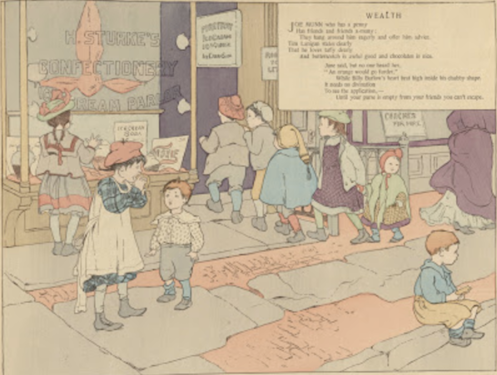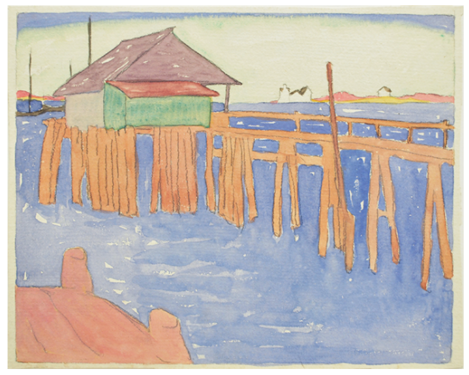Maud Hunt Squire
Maud Hunt Squire | |
|---|---|
 Squire in 1935 | |
| Born | January 30, 1873 Milford, Ohio, U.S. |
| Died | October 25, 1954 (aged 81) "La Farigoule", Vence, France |
| Resting place | Saint Paul de Vence Cemetery, Saint-Paul-de-Vence, France 43°41′38″N 7°07′16″E / 43.694°N 7.121°E |
| Nationality | American |
| Education | Art Academy |
Maud Hunt Squire (January 30, 1873 – October 25, 1954) was an American painter and printmaker. She had a lifelong relationship with artist Ethel Mars, with whom she traveled and lived in the United States and France.
Early life and education
[edit]Squire was born on January 20, 1873, in Milford, Ohio[1] to her mother and Alfred Squire, who was a violinist and musician. Alfred gave music lessons and owned a music store. Her mother gave lessons in drawing. Squire was a talented musician and artist and was gifted in other languages.[2]
Squire attended the University of Cincinnati and graduated in 1894.[3] Squire studied at the Art Academy of Cincinnati from 1894 to 1898;[4] her instructors were Lewis Henry Meakin and Frank Duveneck.[5] The second in her class, she received the Alumnal Gold Medal for excellence in mathematics and Latin and the Sinton Gold Medal, which was awarded by the board.[6]
Career
[edit]Squire gained notice for her color intaglio prints and her work in colored pastels,[7] and was active as a book illustrator beginning while she was still a student;[5] much of her work in the field was published jointly with Mars.[8] She became a member of the Société Salon d'Automne, the Société des Dessinateurs et d'Humoristes, and the Société Nationale des Beaux-Arts, and exhibited work widely, including at the Pan Pacific International Exposition of 1915.[4] A joint exhibit of works by Squire and Mars was held at the Mary Ryan Gallery in New York in 2000.[9]
Personal life
[edit]
She met Ethel Mars, with whom she would remain for the rest of her life, at the Art Academy of Cincinnati. The couple went to Paris in 1903, remaining there until the outbreak of World War I forced them to return to the United States in 1915. They went to Provincetown, Massachusetts, both becoming active in the local art scene. Some years later they returned to France, living in Vence for the rest of their lives while traveling throughout Europe.[4]
Squire and Mars were great friends of Gertrude Stein and Alice B. Toklas while living in France, and the writer's poem "Miss Furr and Miss Skeene", believed to be the first such work to use the word "gay" to describe homosexuality,[10] is meant to describe the couple.[5] Edna Boies Hopkins was another friend of both Squire and Mars throughout their lives; she also attended the Art Academy and lived near them in Paris.[11]
The couple went into hiding in Grenoble during World War II, but returned to their home, La Farigoule, afterwards. Squire died of heart failure there on October 25, 1954,[1] and is buried with Mars, who survived her,[10][12] in the town cemetery of Saint-Paul-de-Vence.
Gallery
[edit]- Children of Our Town, Wealth, 1902
- Le panier de poissons, eau-forte en couleur (1910), Maud Hunt Squire
- Untitled (Pier with green and purple shack),Watercolor and graphite ca. 1915.
- Maud Hunt Squire, Clam Diggers, woodcut print, 1917
References
[edit]- ^ a b "Maud Hunt Squire, October 25, 1954 death", Reports of the Deaths of American Citizens, compiled 01/1835- 12/1974. Publication A1 5166. NAI: 6138 57. Record Group 59, Maryland, U.S.A.: National Archives at College Park, December 15, 1954,
Note: Some sources incorrectly state that she died in 1955.
- ^ Catherine Ryan (2000). "Maud Squire". Tres Complementaires. Mary Ryan Gallery. Retrieved February 12, 2017 – via Jules Heller Gallery.
- ^ "The Cincinnatian [1894]". digital.cincinnatilibrary.org. Retrieved 2021-10-01.
- ^ a b c Jules Heller; Nancy G. Heller (19 December 2013). North American Women Artists of the Twentieth Century: A Biographical Dictionary. Routledge. p. 11. ISBN 978-1-135-63882-5.
- ^ a b c "Maude Hunt Squire". Retrieved 12 February 2017.
- ^ Cincinnati Board of Education. Annual Report. 1891. p. 85.
- ^ "Mary Ryan Gallery: Artists: Maud Hunt Squire". Retrieved 12 February 2017.
- ^ "Maud Hunt Squire (Squire, Maud Hunt, 1873–1954) – The Online Books Page". Retrieved 12 February 2017.
- ^ Grace Glueck (November 3, 2000). "Art In Review; 'Tres Complementaires'". The New York Times. Retrieved February 4, 2017.
- ^ a b Erika Holst (March 13, 2014). "Crossing boundaries: Springfield's other famous artist, Ethel Mars". Illinois Times. Archived from the original on February 5, 2017. Retrieved February 3, 2017.
- ^ Dominique H. Vasseur (2007). Edna Boies Hopkins: Strong in Character, Colorful in Expression. Ohio University Press. p. 2. ISBN 978-0-8214-1769-0.
- ^ Jules Heller; Nancy G. Heller (19 December 2013). North American Women Artists of the Twentieth Century: A Biographical Dictionary. Taylor & Francis. p. 365. ISBN 978-1-135-63889-4.
Further reading
[edit]- Penny Dunford (1989). A Biographical Dictionary of Women Artists in Europe and America since 1850. Philadelphia: University of Pennsylvania Press.
- Chris Petteys (1985). Dictionary of Women Artists. An international dictionary of women artists born before 1900. Boston: G.K. Hall & Co.
- Tellier, Cassandra L, James M. Keny, and Tara Keny. The French Connection: Midwestern Modernist Women, 1900-1930 (Columbus, Ohio: The Schumacher Gallery, Capital University : In association with Keny Galleries, 2014)
External links
[edit]![]() Media related to Maud Hunt Squire at Wikimedia Commons
Media related to Maud Hunt Squire at Wikimedia Commons
- Painting by Squire of herself and Ethel Mars, date unknown
- M. H. Squire at Library of Congress, with 9 library catalog records


 French
French Deutsch
Deutsch



